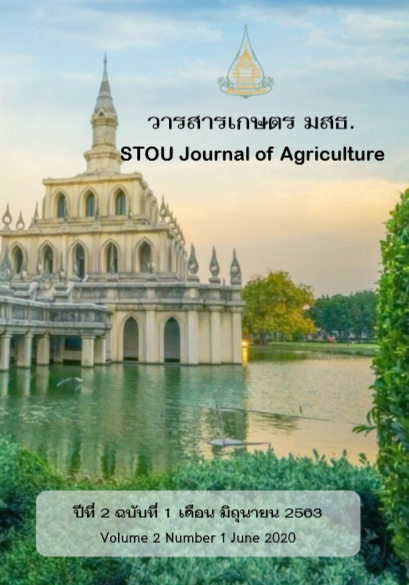การพัฒนาเกษตรกรและองค์กรเกษตรกรสู่การเป็นเกษตรกรปราดเปรื่อง และองค์กรเกษตรกรต้นแบบ
Main Article Content
บทคัดย่อ
การพัฒนาเกษตรกรและองค์กรเกษตรกรสู่การเป็นเกษตรกรปราดเปรื่องและองค์กรเกษตรกรต้นแบบ ยึดเกษตรกรเป็นศูนย์กลางของการพัฒนา ใช้กระบวนการกลุ่มและเครือข่ายเป็นกลไกการพัฒนาตามหลักปรัชญาของเศรษฐกิจพอเพียง เน้นการมีส่วนร่วมของเกษตรกรในชุมชน ให้ร่วมคิด ร่วมทำ ร่วมรับผลประโยชน์ สามารถพึ่งพาตนเองได้ และมีการรวมกลุ่มเชื่อมโยงเครือข่ายในด้านต่างๆ เพื่อให้เกิดความก้าวหน้าไปอย่างสมดุลกับสภาพแวดล้อมในแต่ละท้องถิ่นที่มีการพัฒนาต่อเนื่องและเป็นขั้นตอน โดยการประยุกต์ใช้ความรู้ ภูมิปัญญาและทรัพยากรด้านต่างๆ ที่มีอยู่อย่างเหมาะสม บนพื้นฐานของคุณธรรม ความซื่อสัตย์สุจริต ขยันหมั่นเพียร เอื้อเฟื้อแบ่งปัน และใช้สติปัญญาในการตัดสินใจและดำเนินชีวิต โดยมีเจ้าหน้าที่ส่งเสริมการเกษตรเป็นผู้จัดการเรียนรู้ให้แก่เกษตรกร และหน่วยงานภาครัฐเป็นผู้เสริมหนุน มีกลุ่มเป้าหมาย 6 ประเภท ได้แก่ เกษตรกรทั่วไป เกษตรกรรุ่นใหม่ กลุ่มส่งเสริมอาชีพทางการเกษตร กลุ่มแม่บ้านเกษตรกร กลุ่มยุวเกษตรกร และอาสาสมัครเกษตรหมู่บ้าน มีเป้าหมายเพื่อสร้าง/ผลักดันเกษตรกรให้มีความพร้อมเป็นเกษตรกรปราดเปรื่องและองค์กรเกษตรกรต้นแบบ นำไปสู่การเป็นผู้ประกอบการมืออาชีพให้มีความสามารถในการบริหารจัดการผลผลิต การตลาดสินค้าเกษตร การบริหารจัดการองค์กรเกษตรกร จะส่งผลให้เกษตรกรและองค์กรเกษตรกรมีความเข้มแข็ง มีคุณภาพชีวิตที่ดี ความอยู่ดีมีสุข มีเกียรติ ศักดิ์ศรี และรักในอาชีพเกษตร จะเป็นกำลังสำคัญในการขับเคลื่อนภาคการเกษตรในอนาคตต่อไป
Article Details
บทความที่ได้รับการตีพิมพ์เป็นลิขสิทธฺ์ของวารสารเกษตร มสธ.
ข้อความที่ปรากฎใน
เอกสารอ้างอิง
กรมส่งเสริมการเกษตร. (2560). แผนยุทธศาสตร์ส่งเสริมการเกษตร ระยะ 20 ปี (พ.ศ. 2560-2579). กรุงเทพฯ: ฝ่ายโรงพิมพ์ สำนักพัฒนาการถ่ายทอดเทคโนโลยี กรมส่งเสริมการเกษตร.
กรมส่งเสริมการเกษตร. (2561). เศรษฐกิจพอเพียงกับภาคเกษตร. กรุงเทพฯ: นิวธรรมดาการพิมพ์ (ประเทศไทย) จำกัด.
กรมส่งเสริมการเกษตร กองพัฒนาเกษตรกร. (2560ก). Young Smart Farmer อนาคตและทิศทางภาค เกษตรไทย. กรุงเทพฯ: โรงพิมพ์ชุมนุมสหกรณ์การเกษตรแห่งประเทศไทย จำกัด.
กรมส่งเสริมการเกษตร กองพัฒนาเกษตรกร. (2560ข). คู่มืออาสาสมัครเกษตรหมู่บ้าน (อกม.) ฉบับปรับปรุง 2560.กรุงเทพฯ: นิวธรรมดาการพิมพ์ (ประเทศไทย) จำกัด.
กรมส่งเสริมการเกษตร กองพัฒนาเกษตรกร. (2560ค). คู่มือการจัดทำแผนการผลิตรายบุคคล (Individual Farm Production Plan – IFPP). กรุงเทพฯ: โรงพิมพ์ชุมนุมสหกรณ์การเกษตรแห่งประเทศไทย จำกัด.
กรมส่งเสริมการเกษตร กองพัฒนาเกษตรกร. (2561ก). Smart Farmer ต้นแบบอนาคตภาคเกษตรที่ยั่งยืน. กรุงเทพฯ: โรงพิมพ์ชุมนุมสหกรณ์การเกษตรแห่งประเทศไทย จำกัด.
กรมส่งเสริมการเกษตร กองพัฒนาเกษตรกร. (2561ข). คู่มือการดำเนินงานกลุ่มยุวเกษตรกร. กรุงเทพฯ: โรงพิมพ์ชุมนุมสหกรณ์การเกษตรแห่งประเทศไทย จำกัด.
กรมส่งเสริมการเกษตร กองพัฒนาเกษตรกร. (2562ก). คู่มือการส่งเสริมการรวมกลุ่มและบริหารจัดการกลุ่ม. กรุงเทพฯ: โรงพิมพ์ชุมนุมสหกรณ์การเกษตรแห่งประเทศไทย จำกัด.
กรมส่งเสริมการเกษตร กองพัฒนาเกษตรกร. (2562ข). คู่มือการจัดตั้งและดำเนินงานกลุ่มแม่บ้านเกษตรกร. กรุงเทพฯ: กรมส่งเสริมการเกษตร.
คณะอนุกรรมการจัดทำแผนเพื่อการบริหารความมั่นคงทางด้านอาหาร คณะกรรมการนโยบายและแผนพัฒนาการเกษตรและสหกรณ์. (2560). กรอบยุทธศาสตร์ความมั่นคงด้านอาหาร กระทรวงเกษตรและสหกรณ์ (พ.ศ. 2560 - 2564). กรุงเทพฯ: กระทรวงเกษตรและสหกรณ์.
สำนักงานเกษตรและสหกรณ์จังหวัดนครศรีธรรมราช. (2563). สรุปข้อมูลสถิติการเกษตรและสหกรณ์ที่สำคัญ. สืบค้นจาก: https://www.opsmoac.go.th/nakhonsithammarat-dwl-files-421191791137
สำนักงานสถิติแห่งชาติ. (2563). สรุปผลการสำรวจภาวการณ์ทำงานของประชากร เดือนกุมภาพันธ์ พ.ศ.2563. กรุงเทพฯ: สำนักงานสถิติแห่งชาติ.
สำนักงานสภาพัฒนาการเศรษฐกิจและสังคมแห่งชาติ. (2563). ยุทธศาสตร์ชาติ พ.ศ. ๒๕๖๑ – ๒๕๘๐ (ฉบับประกาศราชกิจจานุเบกษา). สืบค้นจาก: http://nscr.nesdb.go.th/


